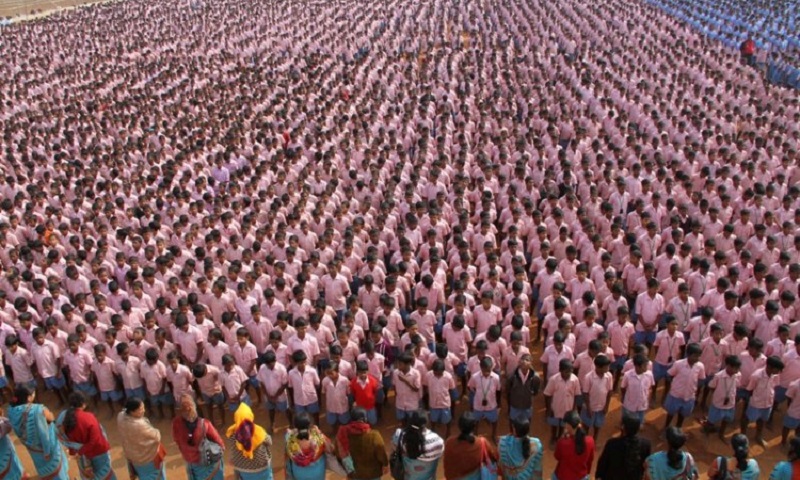
An Innovation for Social Inclusion
Kalinga Institute of Social Sciences (KISS) is a residential institute founded by Dr. Achyuta Samanta for 25,000 neglected and deprived indigenous children located at Bhubaneswar, Odisha, India. As a model institution in the country meant for the indigenous population (covering 62 communities including 13 primitive communities), it provides education (from Standard I to Post Graduation), accommodation, food, health care, study material, clothing, vocational training (farm and non-farm sector), games and sports, computer education etc. to the students totally free of cost. It addresses problems of illiteracy, poverty, malnutrition, child labour, growing radical armed movements etc. KISS has been accorded UN Consultative Status by United Nations. Recently, KISS has entered the list of top 500 NGOs in the world.
KISS directly addresses UN Sustainable Development goals (SDGs) 1, 2, 3, 4, 5, 8, 13, 16 and 17.
KISS Impact:
We have always worked hard to see changes in the tribal students in our Institute through holistic development and support comprising the empathy, teamwork, leadership and problem solving. There are thousands of stories which are case-studies in themselves. Here I shall illustrate two simple and problem ridden tribal girls whose lives have been transformed, and who have now become change makers:
Ms. Bahalin Minz- A Banker as a Changemaker (KISS Alumnus)
“I am better equipped to handle life’s complex issues today”, Bahalin Minz, a Bank PO (Assistant Manager of a National bank), a KISS alumni pronounces carefully as she goes on to spell out the greater sense of responsibility that comes with it.
Twenty one year old Bahalin, belonging to the Scheduled Tribe (ST), was pursuing her graduation course in Computer Science. She is from a remote village named Chungimati from Odisha’s Sundargarh district. The second among three siblings, Bahalin was about to stop her education after her 12th class realizing her parents’ adverse financial conditions. There was no thinking back after she got an admission confirmation letter from KISS. Bahalin was constantly assailed by fear and inhibition and realized that she badly needed to overcome them to move ahead. But she did not know how.
Bahalin was then trained as a peer educator at KISS. The training was unlike any other the usual classroom sessions. It was not only interactive and encouraged participation, it involved warm up rounds, role playing and games along with presentations breaking the monotony. This invoked more meaningful engagement with the discourse. Life skill based education is an interactive process of teaching and learning which enables children and young people to acquire knowledge, attitude and skills which support the adoption of healthy behaviour such as taking greater responsibility for their own lives, making healthy life choices, gaining greater resistance to negative pressures, and minimizing harmful behaviour.
“It gives us a sense of responsibility. We take turns in looking after health and hygiene of students, help them with home work and counsel on adolescent sexual health and social and emotional issues. Sometimes, we also try and intervene to curb harmful behaviours among some students.”
To the matured girls, she provided information on menstrual hygiene and related protection measures. She was also a part of the supervising team which looks after the Sanitary Napkin Unit.
Bahalin is happy and content that her role goes beyond these activities. Recalling an experience from her routine visits as peer educator, she narrated how a six year old girl cuddled near her with a hope to find some comfort.
Bahalin has successfully organised summer camps in her village on the value of girl child where there were more than 50 eager participants. “The grassroots health workers recognize my ability and would ask for my support in organizing awareness campaigns on various issues.” She has supported three such camps during her summer stay at home including one on AIDS awareness.
But spreading awareness on the education of girl child is an issue of concern she wishes to take up as a responsible citizen. The first step has already been taken, and miles to go before she achieves her real goal of making others changemakers.
Lessons Learned:
The larger educational system needs to be more inclusive. Inclusive in terms of becoming needs based rather than only typical curriculum based pedagogy. More holistic education is the needed. Education has to be linked with livelihood and industry. We have been influencing larger educational systems by emphasising the need for residential schools for indigenous peoples as they come from scattered, inhospitable terrain. More needs-based life skill education, mother-tongue based multilingual education, English access programs and computer education, along with vocational training for self employment is propagated with many schools looking for such amendments.
Learn more about the Kalinga Institute of Social Sciences.
 Welcome to the United Nations
Welcome to the United Nations